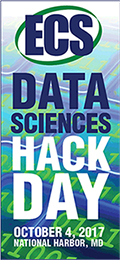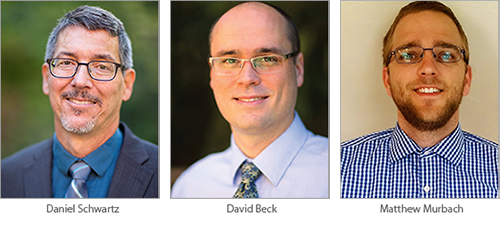ECS Data Sciences Hack Day
October 4, 2017 | 0830-1700h
National Harbor, MD
Application Deadline: September 15, 2017

This ECS Data Sciences Hack Day is the Society’s first foray into building an electrochemical data sciences and open source community from the ground up. Dataset sharing and open source software have transformed many “big science” areas such as astronomy, particle physics, synchrotron science, protein and genomic sciences, as well as computational sciences.
These fields have been supported by, and have actively developed, cloud-based computing and storage tools such as Github, Zenodo, FigShare, etc. Data science tools and approaches also have the potential to transform bench science like electrochemistry. The critical need is to build a community of electrochemical data scientists, the people who will contribute to a growing library of shared experimental and computational datasets, and who develop and adapt open source software tools.
Meet the Organizers

Professors Daniel Schwartz and David Beck will lead the session, supported by Matthew Murbach. Daniel Schwartz is the Boeing-Sutter Professor of Chemical Engineering and Director of the Clean Energy Institute at the University of Washington, and brings electrochemistry and modeling expertise to the team. David Beck is a Sr. Data Scientist with the eSciences Institute at the University of Washington, and leads regular hackathons; he is Associate Director of the NSF Data Intensive Research Enabling CleanTech (DIRECT) PhD training program. Matthew Murbach is president of the University of Washington ECS Student Chapter, and an advanced data sciences PhD trainee; he has been leading the student section software development sessions on the UW campus, and has practical experience coaching electrochemical scientists and engineers in software development.
Who should attend?
All electrochemical engineers can benefit from this workshop, whether experimentally or theoretically focused. Learning how to create, share, use, and improve open source software tools and public datasets is one way to accelerate research progress in our field.
Travel Grants
More than 10 participants in ECS Hack Day will be supported by travel awards made possible by generous grants from the Army Research Office and the University of Washington Clean Energy Institute. Please indicate your interest in being considered for a travel award when completing your ECS Hack Day application.
Schedule
Kick-off and overview (1 hour)
Daniel Schwartz
The introduction will describe how data science tools are transforming other fields, and then will introduce some of the traditional methods for acquiring and analyzing electrochemical data. The focus of this introduction will be to demonstrate how data science tools can facilitate closer collaboration between modeling and experimental communities. Participants will engage in a discussion of how to extend these techniques to new domains, ideas for making the analysis easier to implement for experimentalists, as well as areas where software can improve the reproducibility or usefulness of electrochemical analysis.
Introduction to a few data science tools (2 hours)
David Beck and Matt Murbach
This segment will introduce several tools for contributing to and building open-source software for scientific data analysis. The format will be based on the Software Carpentry workshops and will include basic techniques for working with git/GitHub. Attendees will be required to have a basic set of software (text editor, python with Anaconda, bash shell) installed on their computers prior to the event. The last 45 minutes will be a walkthrough of a basic example of using the above techniques to write a script for plotting and analyzing data discussed in the first part of the hack day.
Lunch (1 hour)
Sponsored by the UW Clean Energy Institute
The lunch break will provide an opportunity for attendees to interact, discuss ideas, and brainstorm projects for the afternoon hack session. The lunch session will begin with brief, 2-3 minute pitches of some ideas for the hack session. Discussions during lunch can be used to refine the ideas and form teams. Time will also be available for anyone who needs help troubleshooting the installation of their software to get help from the organizers.
Hack session (4 hours)
David Beck and Matt Murbach
The goal of the session will be to brainstorm and add new features to existing software, create new software tools for open-source analysis of electrochemical data, and foster interactions between modelers and experimentalists. A few ideas for projects will be pre-selected (by working with those attendees who have significant experience or projects of their own) with the opportunity for self-generated projects being encouraged. After a short brainstorming discussion, groups will coalesce around the projects of interest where those with significant experience are distributed among the groups. Time will then be given to work on these projects with a half hour reserved at the end for a 5-minute discussion of the progress made for each project. A project page, through the Center for Open Science’s Open Science Framework, will be created to record and share the results of the workshop.
Selection of attendees
The goal of this event is to increase awareness and impact of data science tools, open source software, and shared datasets in electrochemistry by bringing together people from different backgrounds to collaborate. We expect to have 36 slots for attendees, and will seek to build a cohort comprised of people with a diverse mix of experimental and theoretical electrochemical expertise, as well as a range of prior experiences creating and using open source software and python programing.
Application Process
To be considered for a spot at this first-ever hack day, and to be eligible for a travel grant, those interested should complete the application form, here. Application deadline is September 15, 2017.




